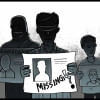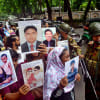Ensure justice for the disappeared

Ousted Prime Minister Sheikh Hasina's direct involvement in cases of enforced disappearance, as revealed in the finding of the inquiry commission's preliminary report, confirms our foreboding that these gross human rights violations were state-sponsored, with orders coming from the highest echelon of power. Otherwise, this heinous crime could not have continued for so long without any perpetrator ever being tried.
The inquiry commission, formed on August 27 to investigate cases of enforced disappearances from 2009 to August 5, 2024, also found prima facie evidence against Hasina's defence adviser Maj Gen (retd) Tarique Ahmed Siddique, former director general of the National Telecommunication Monitoring Centre Maj Gen Ziaul Ahsan, and senior police officers Monirul Islam and Md Harun-Or-Rashid. Of the four, Tarique, Monirul and Harun are still absconding. The commission's report detailed how trained professionals in forces, including Rab, DGFI, DB, CID, and CTTC, "deliberately designed the system of enforced disappearances over 15 years in a fashion calculated to avoid detection and attribution of responsibility."
In fact, the commission estimates that the actual number of enforced disappearances might exceed 3,500—more than double the 1,676 complaints they received so far. To date, the commission has examined 758 complaints, and in 27 percent of the cases, the victims never returned. The report revealed how many victims were executed mercilessly and evidence buried. The victims' families have the right to know details including the locations of the execution. Another interim report will be published by the commission in three months, but the final report will take at least another year. While it is necessary to take as much time as needed for a proper investigation, the concerns of the families and rights activists that much evidence might be lost or destroyed during this time should also be taken seriously. The government must ensure that no perpetrator goes free because of any lapse in collecting and preserving evidence or delay in starting the trial process. It is, therefore, imperative to unearth and preserve all the Aynaghars, which, according to the latest findings, now total nine.
Meanwhile, we welcome the commission's recommendation to enact a new law criminalising enforced disappearance and amend the Anti-Terrorism Act 2009, which has been used as a weapon to victimise many innocents. The commission's recommendation to disband Rab, which was found involved in 172 cases of enforced disappearance, should be considered and weighed against the alternative of extensive reform. Most of all, everyone, including Sheikh Hasina, must be held accountable for their involvement in enforced disappearances, which not only traumatised surviving victims for life but broke many families who, not knowing the fate of their loved ones, cannot get closure.


 For all latest news, follow The Daily Star's Google News channel.
For all latest news, follow The Daily Star's Google News channel. 









Comments